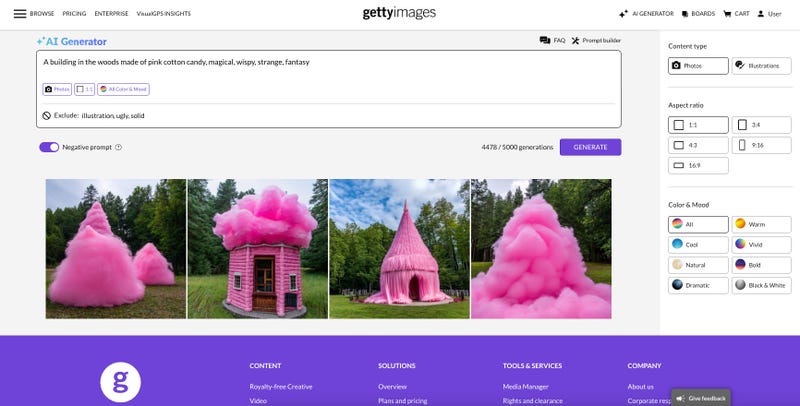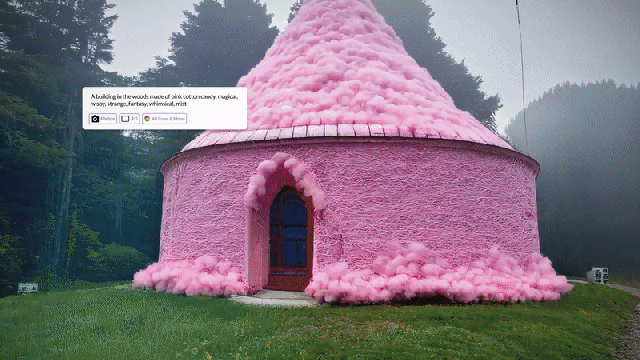After grinding its teeth about AI for over a year, one of the biggest stock image sites around, Getty Images, will let subscribers start creating their own AI images through its site. The company promises users won’t have to worry about all those sticky copyright issues since its AI is only trained on Getty’s own images.
This week, the company announced that its first AI image generator was available and free to use for regular Getty customers. Getty is using the Edify AI model, one of the enterprise AI tools from the Nvidia Picasso cloud service established earlier this year. That system is trained on all Getty contributors’ images, even the more expensive premium content. Every image that users generate comes with the boilerplate royalty-free license. The created images do not get added back into Getty’s stock library.
When creating images, users have the choice between several different aspect ratios as well as different filters you might see in most bare-bones image editing apps. There’s also a prompt-building tool that breaks down each prompt into a subject, verb, and general description.

It wasn’t too long ago that Getty Images told its contributors it wouldn’t accept any image submissions that were created using AI. Getty has been particularly concerned about the copyright of its own images, citing “open questions with respect to the copyright of outputs from these models” as well as “unaddressed rights issues with respect to the underlying imagery and metadata used to train these models.”
Since then, other stock image services including Shutterstock and Adobe Stock, have established their own AI image generation tools. Shutterstocks’ tool is built on OpenAI’s DALL-E model, and the dataset used to train the AI was licensed from Shutterstock’s own contributors.
In a release, Grant Farhall, Getty’s chief product officer, said they “heard both excitement and hesitation” from customers about AI images, and that the company tried to be “intentional” about how it rolled out its new tool.
Adobe Stock makes use of its own Firefly tool, and it also has used all the images from its own contributor slate for help crafting new images. Both companies have promised to compensate the contributors based on how many images were taken to train the AI, but neither company has given any contributing photographers or illustrators much choice.
It’s the same story for Getty. The company told Gizmodo it established a “contributor compensation model for AI licensing,” which will share profit generated by the tool with its contributors annually. How much each contributor makes will be based on how many files they’ve uploaded to the site as well as how much they were making through traditional licensing. The company called this a “new revenue stream for contributors,” though of course none who provided the images can choose to opt-out unless they terminate their agreement with Getty.
Earlier this year, Getty announced it was suing Stability AI, the makers of Stable Diffusion, alleging the company violated copyright on 12 million images from its site. These images were used to train the Stable Diffusion model, and though that model has improved into its current Stable Diffusion XL version, earlier renditions of the AI would occasionally spit out images containing a Getty watermark, albeit distorted.
The original complaint mentions how using these watermarks on “low quality, unappealing, or offensive images dilutes those marks,” basically saying the shitty AI images were detrimental to Getty’s brand. Inevitably, Getty’s AI model will produce some strange results. It’s the curse of all AI image generators, no matter how big their training data is or how sophisticated the model may be. That won’t change with the stock image’s site’s Edify model.
We asked Getty about whether this new AI would impact the lawsuit. The company said in a statement that “Stability AI trained its models with content without the consent of copyright holders. We have trained our model with creative content for which there is a license and contributors will be compensated. Generative AI tools and services should be transparent as to the data that is used for training, as well as the outputs that were created using generative AI.”
